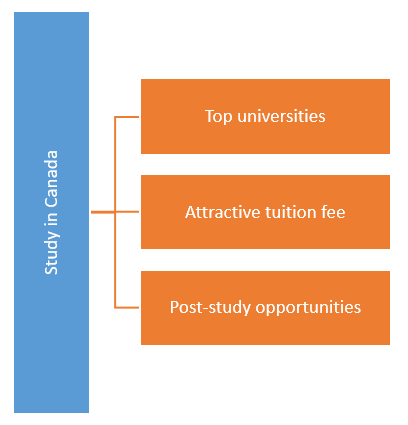PhD Study in Canada: All you need to know
Ph.D. in Canada: Canada is now an established study destination for international students to pursue their higher studies. Apart from experiencing the country's multicultural society and beautiful landscapes, students gain excellent quality education.
Canada is home to some of the best universities in the world. Seven of the world's top 150 higher education institutes are located in Canada. In this article, we will inform you everything about studying Ph.D. in Canada.
A Ph.D. or a doctoral degree is the highest recognized academic degree one can earn ( with few exceptions). Candidates usually require a master's degree to be admitted to a Ph.D. degree, however, few universities in Canada allow students to pursue a Ph.D. after a bachelor's degree. Few universities also allow candidates to progress to a Ph.D. right after their master's degree. A Ph.D. in Canada usually lasts from four to six years and a student gets a lot of research opportunities. During this time a student is expected to perform significant research in his/her field of study and present a thesis or dissertation. Some universities require candidates to submit coursework while some require students to submit a list of published papers in recognized journals.
- Is a Ph.D. in Canada free?
- How to apply for a Ph.D. in Canada?
- Documents required to apply for a Ph.D. in Canada
Is a Ph.D. in Canada free?
This is the most important question for Ph.D. aspirants. Tuition fees for a Ph.D. in Canada vary from university and course selection. The tuition fee for international students is comparatively more than for Canadian students. The University of Toronto is one exception for this case, as it started charging international students the same tuition fee as Canadian students in the fall of 2018.
Admission requirements for a Ph.D. program
Eligibility criteria for getting into a Ph.D. program in Canada vary based on universities and courses. Some of the basic requirements for a Ph.D. are:
- A master's degree
- Proven track record of previous research work
- English language proficiency: IELTS, TOEFL, PTE or Duolingo scores
- GMAT or GRE scores depending on your area of study
In a few cases, universities may allow students to progress to a Ph.D. program right after their master's degree, however, they need to have an exceptional track record of excellent academic grades and research publications.
Predict your IELTS, TOEFL, and PTE in just 4 steps!
How to apply for a Ph.D. in Canada?
This is one of the most important steps to fulfill your target of pursuing a Ph.D. in Canada.
- First of all, you need to decide which course you want to apply to. Select a topic that is worth consideration by your supervisor and the university.
- Research the department and the supervisor whom you need to contact before applying for a Ph.D. program. Few universities may ask for a letter of support from the supervisor at the time of the Ph.D. application process.
Documents required to apply for a Ph.D. in Canada
- Research proposal - For a Ph.D. program, you need to submit a detailed research proposal. In a few universities, you need to submit it to the supervisor of the concerned department while at a few universities you need to submit it at the time of filing the application
- Statement of Purpose - A Statement of Purpose for Ph.D. tells about your academic and professional background apart from your achievements
- Letter of Recommendations - You need to submit two/three LORs/Reference letters depending on the university
- Academic transcripts - Many Canadian universities ask students to submit an official academic transcript
- Academic documents - Degrees or mark sheets of your previous education
- Curriculum Vitae
Selkirk College Canada expects a non-refundable application fee from international students, which is USD 100 (INR 8K). International students must fill out the application form where they must upload documents like transcripts, test scores, passport ID page, resume, and more. At the end of the application, international students can expect to pay the application fee, and once their application meets eligibility, they get an offer of acceptance.
Both the University of Lethbridge and Memorial University of Newfoundland are among the top universities in Canada for international students. They offers the quality education at a low cost compared to other top MS in CS universities in the world. We have compared them in the table below in terms of tuition fee and ranking:
MS in CS Universities | Tuition Fees | US News World Ranking |
|---|---|---|
University of Lethbridge | INR 10 L | 1741 |
Memorial University of Newfoundland | INR 4.7 L | 698 |
Pick your stage and get free guidance from counsellors who've helped thousands get into top universities.
 Starting research
Starting research Shortlisting colleges
Shortlisting colleges Exam preparation
Exam preparation SOP/LOR writing
SOP/LOR writing Scholarship & finance
Scholarship & finance Visa application
Visa application



According to the student review on the unofficial web, pursuing a PGDBA is not a great option in Canada, and pursuing an MBA is far better than that. However, international students who are looking for an affordable option can choose PGDBA from Selkirk as they offer programs way cheaper than other SPP colleges in Canada. In addition, Selkirk College has supporting faculty members and smaller class sizes which means students will get to learn a lot with assignments and projects and get three years to showcase their talent to grab the best career.